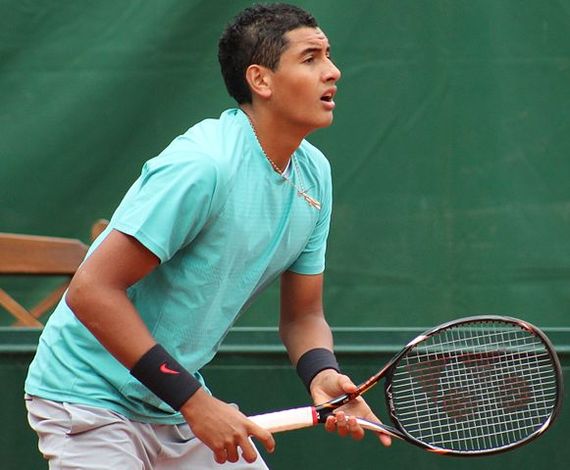

Image: Sirobi - Nick Kyrgios playing at Roland Garros 2013, CC BY-SA 3.0
Asked last month to describe himself in one word, Australian tennis prodigy Nick Kyrgios replied, "different". And the 21 year-old, World Number 14 really is different.
His shot-making ability - from dazzling tweener winners to delicate drop shots - is outstanding. He has a big serve, huge power on groundstrokes and an attitude which has enabled him to hold his nerve against the toughest opposition.
He has already beaten many of the greats, with wins over Nadal, Federer and Wawrinka under his belt.
There's no doubt he has the talent to be one of the best players on the men's tour over the coming years. He is almost the complete package.
However, there's one significant gap in his current skillset - the ability to remain calm and focussed enough to play consistently well week in, week out. No one gets to the very top of the game without that's skill.
Kyrgios' performance over the last few weeks is a case in point.
He won his first ATP-500 level title in Tokyo in thoroughly professional style, beating in-form players Gael Monfils and David Goffin.
Then, last week, at the more prestigious Shanghai Masters 1000 tournament, he crashed out in the second round to world 110 Mischa Zverev, after receiving a warning (and later a large fine and suspension) for not showing an appropriate level of effort.
Kyrgios was involved in a similar incident at last year's Wimbledon when he appeared to tank in his fourth round match against Richard Gasquet.
Kyrgios is refreshingly honest about his situation. In the press conference following the Zverev match he said he was "physically and mentally tired" and that he "just took the easy way out tonight and obviously didn't show up at all'.
In his previous match against Sam Querrey he said he struggled with boredom, despite winning in straight sets. Kyrgios has previously spoken about his difficulties with motivation, and how he doesn't love playing tennis.
Kyrgios isn't the first tennis talent to have mixed feelings about his sport. Both Andre Agassi and John McEnroe struggled to enjoy playing tennis throughout their careers. But they managed to generate enough competitive drive to achieve great things in spite of their ambivalent feelings.
Tennis Australia have announced that Kyrgios has agreed to consult a psychologist, as part of a deal with the ATP to reduce his current suspension to three weeks.
Addressing his mental approach to the game is crucial. Mental training is vital if players are to realize their full potential. All of the Big Four players (Federer, Djokovic, Nadal, Murray) had to train mentally to capitalize on their talent and win Slams.
But it's the mental training route that World Number 1, Novak Djokovic has taken that holds the most promise for Kyrgios.
Djokovic overcame persistent self-doubt, anger and worry early in his career by training in mindfulness. The skill of mindfulness enables players to notice and accept difficult thoughts and emotions which occur during matches, and then refocus on the task in hand.
Djokovic practices mindfulness meditation every day. For him it's as important as physical training. The mental strength that Djokovic built through mindfulness training transformed him from a precocious but erratic talent, to one of the greatest players of all time.
Kyrgios could make a similar transformation by training in this skill. Learning how to respond in more helpful ways to difficult emotions like anger or boredom, could transform Kyrgios' match experience.
Instead of engaging with these emotions and the thoughts that accompany them, Kyrgios could learn to notice uncomfortable emotions, and then refocus.
Crucially, mindfulness would enhance Kyrgios' ability to enjoy the game. It's never going to be fun to struggle with boredom, frustration or anger on court - but what if you could let go of that struggle, and allow yourself to feel those things without getting caught up in them?
The mindful approach offers Kyrgios a way of maximizing his talent and his mental wellbeing.
I really want to see Nick Kyrgios do well. He plays with variety, verve and a sense of fun which makes him very entertaining to watch.
It's important that we have players like Nick at the top of the game. It would be a shame if a lack of appropriate mental training stopped him from getting there.
Neil Endicott is founder of Mindfulness-Based Tennis Psychology, an online mental training course for tennis players. He also provides one-to-one coaching to players around the world.
